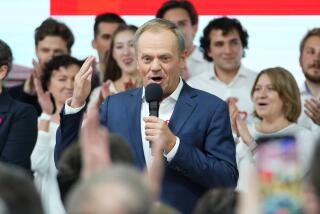Solidarity Ushers In an Era of Pluralism
- Share via
WARSAW — Poland is on the cutting edge of democratic change in Eastern Europe, and the direction it has set may serve as a model for others among communist nations also in ferment these days.
The Polish election earlier this month was not a parliamentary one in the British sense, with power simply moving from a Conservative Party to a Labor Party. It was essentially a referendum on the policies of the government. Solidarity, despite its overwhelming victory, seeks to remain an opposition movement with freedom of action to maneuver and continue its stance critical of the government. A remark able transition from totalitarianism to authoritarianism has already taken place, signified by government recognition of Solidarity. The election represented a third stage, a movement to pluralism. Perhaps four years from now the transition will be to a multiparty state in which Solidarity, if it holds together and is steadfast, may be willing to share power with the Communists.
Ironically, certain thoughtful Solidarity leaders favored a “soft” victory, not the huge one they achieved. Their goal was for greater pluralism, increased freedom and citizens’ rights. But they feared a threatening victory that might prompt government hard-liners controlling the army, the secret police and other government agencies to take control and institute new forms of repression that would invalidate the vote. Moreover, the greater the success of Solidarity and its anti-government cause, the more chance that factions within Solidarity may surface and splinter as issues, such as the rate of economic change and the degree of democratization, come to the fore. In Solidarity the range of opinion, from confrontation to accommodation, is great. An issue like abortion, with its emotional overtones, could split Solidarity deeply, pointing up Catholic-secular divisions.
Yet it was difficult for Solidarity to campaign to win, but not by too much. Special access to national Solidarity headquarters revealed a campaign organization rivaling that of an American political party. Solidarity is a trade union permitted by the government, and the campaign was run by citizens’ committees. The national campaign was housed in an old building with modern equipment--computers and advanced telephone and communications systems to link up with the rest of the country. There was even a resident psychologist and a resident sociologist, perhaps academic-sounding names for “spin doctors” and demographers.
Tours of two cities, Warsaw and Lublin, over a five-day period showed the pervasiveness of Solidarity posters and banners--on walls and fences, in store windows, on trolley cars. There were even bumper stickers stating “I Love Solidarity.” Pictures of candidates with Lech Walesa and even a few with Pope John Paul II were distributed. Posters featuring actresses Jane Fonda and Nastassja Kinski were available but scarce. A large poster picturing Gary Cooper in “High Noon” pose was telling in its message, as was a drawing of a clock with hands set at five minutes to 12. Clearly the showdown was at hand.
The historic round-table agreement that set the stage for the elections allowed the participants two months in which to prepare for the vote. The American-style Solidarity campaign was not matched by any visible Communist Party campaign whatsoever. The pro-government strategy was to have its candidates run without Communist Party designation on posters, and the campaign was not started until a week or so before the June 4 election. Moreover, the Communist Party campaign was openly fragmented. There were several front parties.
The election represented the crisis of communism. Monopolistic control by the Communist Party can no longer be effective in an information age characterized by television, satellites and fax machines, and an election campaign in the party’s name would have been even more humiliating, given the results that were predictable. The election represented a limited democracy with each side getting a share of recognition of its competitive role.
According to Marx, the communist state would wither away at a certain stage of development. Instead, the Communist Party is what is withering away, rent with internal divisions making a coherent policy impossible, with an old membership not capable of renewal or fresh visions. The vision the Polish electorate saw was that of the freedom that the Solidarity campaign epitomized.
It is certain that Solidarity will seek constitutional change to reflect its enhanced position, and will seek to secure multiparty status at elections four years from now. Its success will depend upon a careful strategy and substantial luck. But the movement from totalitarianism through the current stage points inexorably to a wider development of an infrastructure that will include greater freedom, more democracy, expanded citizen rights and an extensive pluralism.
More to Read
Sign up for Essential California
The most important California stories and recommendations in your inbox every morning.
You may occasionally receive promotional content from the Los Angeles Times.













